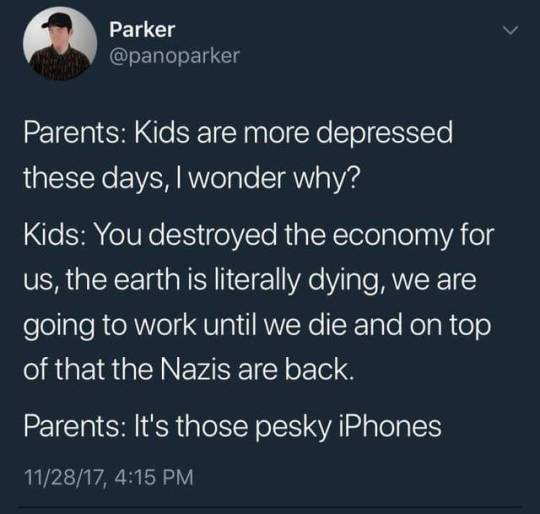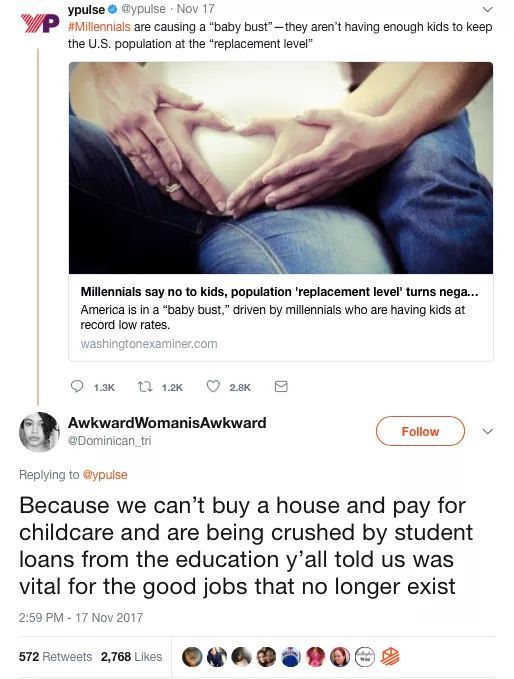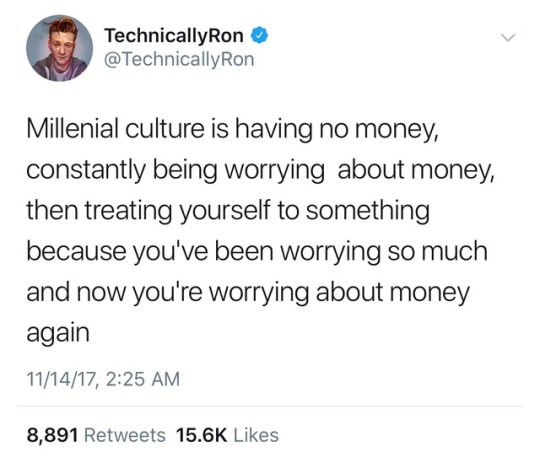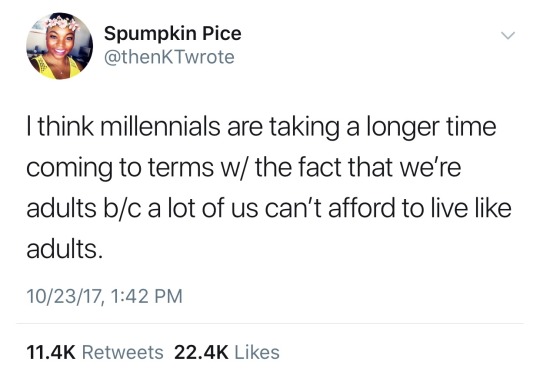Don't wanna be here? Send us removal request.
Text
Is Rock Dead?
I don’t think there’s a single person who doesn’t love music. For me, music is an escape from reality where I can sit and listen to the rhythm of a song and really feel the composition, or connect personally with the lyrics, but it’s more than just “escaping.” Good musicians know how to bring a passion to their voice when singing, making you feel what they feel while they perform. This passion is what reels listeners in, becoming fans and branding themselves as such. Today, rock music is known for its angst lyrics and loud vocals, bringing an either dominating sound to the ears of fans, or showing their feelings to the world. Those feelings are about more personal demons the artists are dealing with and fans really connect with that, but lyrics used to be about social change and was the music behind movements. Now there doesn’t seem to be a focus on politics, so, in a traditional viewpoint, is rock dead?
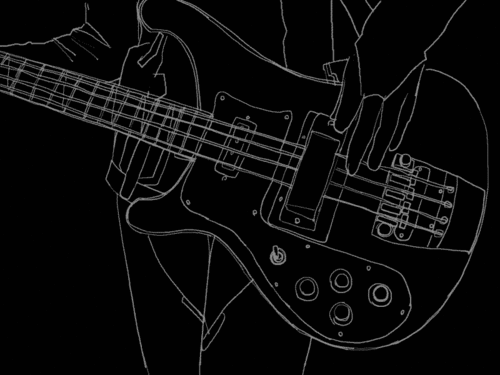
Rock music was born in the fifties, borrowing from rhythm and blues, country, pop, jazz, and other forms to create this intrinsic powerful sound. It developed during the political period of desegregation and then gained more heat during the Cold War. In 1951, a disc jockey from Cleveland named Alan Freed, coined the term “rock n’ roll” making Cleveland the “birthplace of rock and roll” (Orman 3). As rock music started to get more popular, so did the controversy of it. In 1955, older people, even some political elites, started overreacting to rock music and often related juvenile delinquency to rock n’ roll. “Soviets viewed rock n’ roll as another example of western ‘decadence,’ but right-wing extremists in the United States viewed the same music as part of a Communist conspiracy to undermine our society” (Orman 4). So, rock n’ roll almost always was associated with so-called political agendas and a resistance in the youth against higher up’s. In his article, Young writes that during this era, “everything was questioned – from race to gender, from war to the environment, from consumerism to middle-class values, indeed the way of American life itself” (Young 453). Young people were starting to question their way of life, creating this atmosphere of rebellion.
There were many prominent musicians adding to the discourse of protest music during the Vietnam war and civil rights movement era. Bob Dylan, who was influenced by Martin Luther King Jr.’s speeches, was the forefront of the early 1960’s movement because of his political protest songs. “When Bob Dylan burst on the folk scene, protest music really took off” (Young 462). Dylan wrote songs such as “Masters of War,” “The Times They Are a’Changin’, and “Blowin’ in the Wind” that really added fuel to the movement. The “British invasion” included, “the Beatles, the Rolling Stones, the Animals, the Dave Clark Five, the Kinks, and numerous other British groups changed many things in America” (Orman 6). The Beatles in particular made rock n’ roll turn into a more dynamic term known as “rock.” British groups changed many things in America, and Americans started buying records and wanting to create their own garage bands.
“Three Days of Peace and Music” will forever be iconic throughout history. In 1969, Woodstock became the biggest attended festival yet in America with over half a million people in attendance. Fans, or otherwise known as hippies, crowded in the 600 acre field to hear musicians like Janis Joplin, Arlo Guthrie, The Grateful Dead, The Jimi Hendrix Experience, and The Who. “The most memorable moment of the concert for many fans was the closing performance by Jimi Hendrix, who gave a rambling, rocking solo guitar performance of ‘The Star Spangled Banner’” (history.com). This festival was a movement in and of itself against the Vietnam war with most of the musicians performing songs showing their opposition to the war and with most of the fans sharing their views. The late 1960’s and early 70’s was the highlight of rock music because of the songs calling out societal flaws and music against the government. After this era, however, what happened to the political statements and movements rock music brought to their listeners?

In the 1990’s and early 2000’s, bands like Rage Against the Machine and Green Day wrote politically influenced songs. Rage Against the Machine’s song such as “Killing in the Name,” and “Bulls On Parade” speak against police brutality and governments war agendas. Green Day’s “American Idiot” talks about society mindlessly following media and the government. So, after bands like Rage Against the Machine, Green Day, and even U2 who is still currently making music, then what? Where has the politics and call for action within rock music gone? In an interview with Tom Morello done by the Rock and Roll Hall of Fame for their “Louder than Words: Rock, Power, and Politics” exhibit at the museum in 2016, he says, “100 percent of music is political. Music either supports the status quo or challenges the status quo. So every artist is political” (Rolling Stone). He then goes on to explain what he means by saying, “Justin Bieber and Selena Gomez probably don’t identify as political artists, but their music-while often very entertaining and loved by their fan base- is the bread and circuses of our times… if you’re not questioning authority, you’re tacitly submitting to authority...what you say and what you do matters” (Rolling Stone). Can this be said for today's rock music as well?
youtube
It’s commonly known that most pop music today would fall under the category of “submitting to authority” like Morello mentions, but is this true for rock music today as well? When one thinks of rock music, the vision they get in their head is of a group of men wearing leather jackets with tattoos and smoking cigarettes. Why don’t they think of resistance and what the genre was created for? Could it be because the genre is changing? The most popular rock musicians today, according to Billboards charts on “Hot Rock Songs” currently are Imagine Dragons, Bad Wolves, Foster the People, Alice Merton, Panic! At The Disco, Thirty Seconds To Mars featuring Halsey, and Walk The Moon. Later on down the list, we see bands that one might typically associate with rock music more than the bands at the top of chart as I have just mentioned. Those bands include Godsmack, Three Days Grace, Breaking Benjamin and Five Finger Death Punch. So why is it that the bands at the top of list could be somewhat controversial to people who identity as rock n’ roll listeners? Those bands are topping the charts of what Billboard considers “Hot Rock Songs” but are they actually rock?
Rock music started as a rebellion genre against the political machine and societal standards, so shouldn’t that be the standard used when determining if a song or artist today is classified as rock? In a Billboard article titled, “Is Rock Still Relevant In 2016?” the author, Carl Wilson, brings up a good point saying that, “consider how the new rock artists of comparable staying power or cultural significance have emerged since that decade’s [early 1990’s] alt-rock surge. Yes, there are well-regarded figures from the indie, emo and metal scenes, but few of them reach far beyond their niches-” (Wilson). In today’s world of music, what’s considered rock has drastically changed since the genre developed way back when. Wilson is suggesting that rock artist have to change their sound based on what’s popular with current society. For instance, Imagine Dragons has a more pop feel to their music. Before the death of Chester Bennington, Linkin Park’s new album had pop singers as featuring artists, but the most new sound of rock music is Twenty One Pilots. Twenty One Pilots bring a whole mixture of genres into one song and provides lyrics for their listeners to really think about. Wilson writes:
The one rock act that has crossed over in 2016: Twenty One Pilots, an electro-acoustic duo that owes as much to hip-hop and dance as to emo-rock forbears such as My Chemical Romance. Its sound is not amps in the garage but ProTools in the bedroom; its mood is sullen introspection rather than youth rebellion. “I care what you think,” goes part of the refrain from the hit “Stressed Out,” an inversion of Rage Against the Machine’s “F— you, I won’t do what you tell me.” Is this the face of new rock? Introspection rather than rebellion?

A few bands are bringing a “come back” for rock and metal music. The band Nothing More released their self titled album with their once drummer, now frontman, Jonny Hawkins singing thought provoking messages in their lyrics. In their song “This Is The Time” Jonny Hawkins powerful vocals calls to society to look closely how their leading their lives full of hate and trying to be better than next person. Also on the album, the songs Christ On Copyright and Mr. MTV call out politics and societal standards. Nothing More’s newest album “The Stories We Tell Ourselves” conveys the political and social agenda they started to tell in their album previously with songs such as “Do You Really Want It,” “Go To War,” and “Let ‘em Burn.” So, is this the revival rock music needed? In an album review on “The Stories We Tell Ourselves,” Quentin Singer writes, “The band really wanted to make a point out of this song [“Let ‘em Burn”], by showcasing their thoughts on how political and social issues are filled with such tremendous dishonesty throughout today’s media” (Singer). Alongside Nothing More, Papa Roach recently came out with an album titled, “Crooked Teeth” with a few songs addressing politics today: “Born For Greatness” and “American Dreams.” Other bands who are bringing a “revival” to rock music would include Rise Against, Green Day, and what was originally Rage Against the Machine with lead singer Zak de la Rocha, but is now Prophets of Rage with a new lead man. So what does this mean? Why don’t more people know about these musicians?
youtube
Those who say “rock is dead” clearly don’t pay attention to new music and the messages the artists are trying to say. Do we need more rock artists adding to the rebellion against the political machine or do we need more people opening their ears and waking up from their coma induced state created by “feel good” music? Isn’t this the time to stand up against the political agenda and societal standards more than ever? We are grouped together by our generation, being called “those Millennials” with the roll of an eye just as the hippies were during the time of Woodstock. Should there be another Woodstock?
youtube
Is rock music dead? Definitely not. “A disobedient spirit is direly needed to balance out the economic pressures that push both music and media toward a narrow, survival-of-the-fittest emphasis on mega-pop” (Wilson). The “disobedient spirit” Wilson mentions is still alive through bands like Nothing More and Rise Against, but as well as current rap artists like Kendrick Lamar. Rock and metal music may someday not sound the same as it once did because of the ever changing culture and trends, but the “disobedient spirit” it created will always find its way into the lyrics of musicians regardless of genre.
youtube
youtube
Works Cited
Orman, John M. The Politics of Rock Music. Nelson-Hall, 1986.
Rolling Stone. “Tom Morello: 'All Music Is Political, Even Justin Bieber'.” Rolling Stone, Rolling Stone, 20 May 2016, www.rollingstone.com/music/news/tom-morello-all-music-is-political-even-justin-bieber-20160520.
Singer, Quentin. “Album Review: Nothing More's The Stories We Tell Ourselves.” The Berklee Groove, 17 Oct. 2017, www.berkleegroove.com/2017/10/10/nothing-more-album-review/.
Street, J. (2001). Rock, pop and politics. Firth S., Straw, W., Street, J. (ed.) The Cambridge
“Top Rock Songs Chart.” Billboard, www.billboard.com/charts/rock-songs.
Wilson, Carl. “Is Rock Still Relevant In 2016?” Billboard, www.billboard.com/articles/events/year-in-music-2016/7616418/rock-relevant-2016.
1 note
·
View note
Conversation
conversations that I wish would stop happening
"Real" adult: so... what's your major? Your grad school plans? Your next ten years?
Me, technically an adult: I'm majoring in art history and I honestly love it! I don't have any set plans, but I'm really young and I'm just happy with what I'm doing now.
Adult: *starts snickering*
Me: *trying to be polite* haha yeah it's just something I really love, i know it's stupid...
Adult: HOW YOU GONNA GET A JOB WITH THAT hahahaha wow whew hilarious.... good luck with that you stupid millennial.... go eat some avocado toast... haha cracking myself up here
1K notes
·
View notes
Photo

Landlords are class enemies. Especially for millennials who can’t buy homes and have to live in cities to find good job markets.
29K notes
·
View notes
Text
Millennials are not children
So…
The oldest millennials right now are 35. They were born in 1982 and turned 18 in the year 2000.
[edit] Millennials and Gen Y are the same generation, they are not two different things.
Gen Z started in the late 90′s or 2000, depending on your opinion.
But for certain, if you were born after 2000, YOU ARE NOT A MILLENNIAL.
The youngest millennials are just about 18 years old right now if you end the Millennial Generation in 2000.
[edit]: I’d like to note that it is currently 2017. In less than 2 months, it’s gonna be 2018. Everyone born in 2000 is turning 18 next year. And! Guess what! It’s almost next year, the year where all people born in 2000 will be 18!
Furthermore, I’m being generous with ending the millennial generation in 2000. Some sources end it as early as 1995, so there.
So, moving on:
18-35. We are your millennials.
“Younger millennials” are actually Gen Z.
THIS ALL STEMS FROM OUR PARENTS CONTINUING TO INFANTILIZE US.
Millennials are full-grown fucking adults in their twenties and thirties!!!
MILLENNIALS ARE NOT TEENAGERS, MILLENNIALS ARE NOT CHILDREN.
(there is nothing wrong with being a teenager. you’re awesome and great, welcome to Gen Z by the way, also called the iGeneration)
[edit days later] If you’d like sources and can’t be bothered to google this yourself, please check my follow-up post: https://queerly-tony.tumblr.com/post/167383906708/fleetwoodmyass-replied-to-your-post-millennials
65K notes
·
View notes
Text
the thing about millennials who don’t want kids is I feel like a lot of them are deeply On Board for their friends’ kids
like I’m among the minority of my friends in definitely for sure wanting kids someday
but each of my parenthood-eschewing friends has claimed a different role in my future offspring’s life and they seem very excited to play it
so we as a generation may have fewer children
but I feel like they’ll be the most supported and loved children imaginable
176K notes
·
View notes
Text
Millennial Paradox

“Millennials Are Ruining the Breakfast Industry”
104 notes
·
View notes








